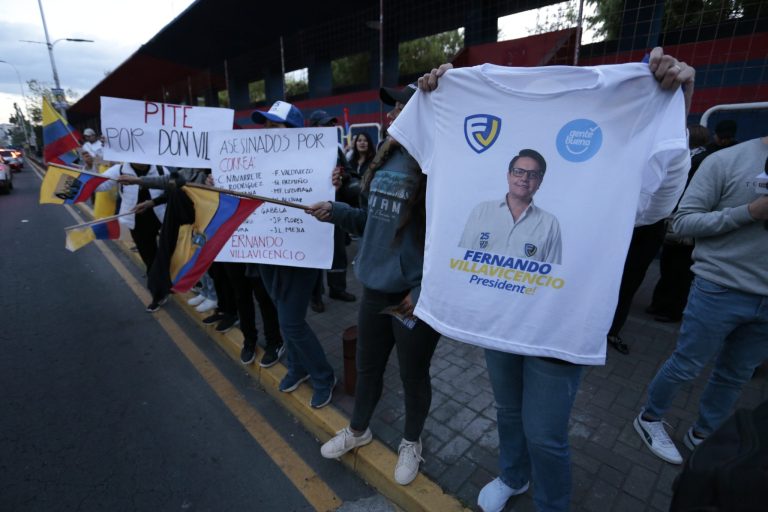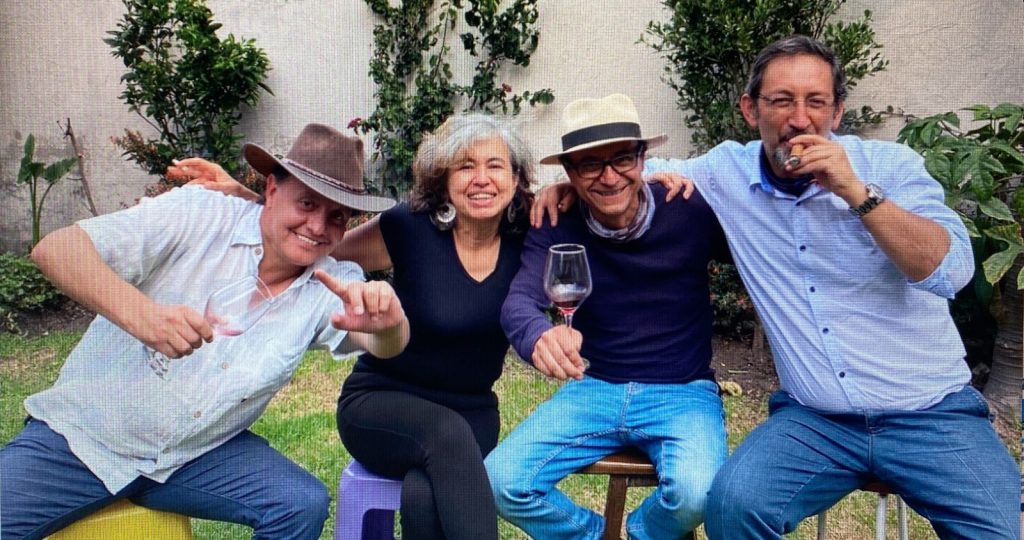21 de agosto 2023

“NicaraguAmor” Cultural Caravan for Nicaraguans in the USA

PUBLICIDAD 1M
PUBLICIDAD 4D
PUBLICIDAD 5D
Reporter Juan Carlos Calderon on the impact of Fernando Villavicencio’s murder and insecurity in Ecuador, where “killing a journalist costs 20 dollars”

A stark reminder of the violence rocking Ecuador may be seen on the ballot on Sunday, August 20, 2023, when the image of slain candidate Fernando Villavicencio remains on the ballot. According to investigative reporter Juan Carlos Calderon, director of Plan V and a personal friend of Villavicencio, the crime left them like a “table without a leg.”
During the years of Rafael Correa’s government (2007-2017), Calderon, Villavicencio and Christian Zurita —confirmed as the substitute of the murdered candidate of Movimiento Construye (Build Movement)—joined forces to investigate power and document corruption. Calderon and Zurita are authors of the book Gran Hermano (Big Brother), which investigated Fabricio Correa, brother of the then-president.
The three journalists were subjected to brutal persecution, but Calderon assures that Villavicencio was treated as a public enemy of Correa’s party. Their decades-long friendship ended unexpectedly on August 9, 2023, when Villavicencio was assassinated by 12 shots fired by hired assassins as he left a campaign event. The event, just a few weeks from the elections, caused the declaration of a state of emergency in Ecuador.

The reason for this crime is the growing crisis caused by insecurity and organized crime. Affected by the crime, Calderon said in an interview with the program Esta Noche and Confidencial that killing a journalist in his country costs 20 dollars. He also analyzes the widespread violence and the electoral impact that the assassination may have.
You were a personal friend of the murdered candidate, Fernando Villavicencio; how has the crime touched Fernando’s inner circle and Ecuador?
There are several levels of repercussions. One is at the level of his colleagues and friends, who were linked to him for the last 30 or 40 years. In my case and Christian Zurita, during the last 20. We were always very close because we did a lot of investigations, reports of human rights abuses and corruption in Ecuador.
The blow was as if it had been given to one of us. We were always proud to think that we resisted and survived the fierce persecution of Rafael Correa’s government. But this time it wasn’t so. And basically, that has been the impact. A huge void, because Fernando was a very rigorous and passionate about his investigative work. And that, of course, leaves the rest of us like a table without a leg.
Why must this crime not go unpunished?
It is the first time that a presidential candidate is killed. It is also the first time that a journalist, who had the right to leave journalism and engage in politics, has been assassinated. He was a person to whom Ecuador owes many truths.
What they did with him was to get him out of the way, because he was mainly dangerous for the big mafias, not only in drug trafficking. They have wanted to sell that it was done by a drug trafficking gang that threatened him. However, here there are several criminal groups linked to corruption in hospitals, mining, and oil. He denounced many situations of corruption, abuse of public funds in the different governments.
So, it will be necessary to see where the threats came from, and which sectors were affected. He must have investigated at some point a sector that decided to eliminate him.
How have journalists reacted?
Obviously, at national and international levels, they have absolutely condemned this atrocious crime. Not only because of how it was done; the ease with which the criminals, the murderers, got to him, despite the police cordon. The doubts that arise regarding the protection or little protection he had. But, as a harsh —let’s say criminal— warning to all other journalists in this country about what can happen to us if we keep digging into corruption.
I read that you were talking about electoral murderers. What is the message that the assassins are sending to the Ecuadorians?
That is why I mentioned this label of a hired electoral assassination. Because it is not enough to eliminate and assassinate politicians who are running for office, as has happened now and at the beginning of the year with the mayoral candidates. There were also ohert attacks and assassinations. But it seems that it has become normalized here to eliminate an inconvenient opponent, or anyone who in some way or another, can be a nuisance. That is, to eliminate a rival as a campaign strategy; political assassination as a way to reach power.
It has something to do with Fernando Villavicencio, because they are also trying to prevent his replacement, Christian Zurita, who is a journalist and a colleague —and also a very good friend of mine, from being certified. Eight days have passed since the assassination, and so far, the Electoral Council has not authorized or approved Christian’s registration. And there are two days left before the campaign silence period, with voting on Sunday August 20th.
What impact do you think this political crime will have in the elections? Can it change the electoral panorama in any way?
I think so. In fact, there was a very strong drop of Correa’s party. Because the first impression that ensued was the perception of a sector of public opinion that Correa’s party was linked to this attack.
Indeed, Fernando had been treated as public enemy number one of Correa’s party, with direct threats from the former president of the type: “You will have nowhere to hide. The party is over for you.” Like some bully, the big shot of the class.
But I must emphasize: they are not the ones that benefit the most electorally. They have lost some points. They aimed to win the first round quickly, but this has definitely brought them down. The estimate is 10 or 12 points. Another big beneficiary is the candidate Jan Topic, of the far-right Partido Cristiano (Christian Party). He proposes a strong hand like (Nayib) Bukele to confront crime and criminal violence in Ecuador.
Some sectors also pointed out that (Topic) is like the second horse on which Correa is riding. In other words, Correa is betting on two sides. It is not known how people will react (in the election). There is a lot of outrage about the crime against Fernando. There is also the intention of exercising a protest vote against the criminals, a vote of condolences, and it is not known how people will react when they see Fernando’s face on the ballot because it will be there.
What was Correa’s reaction, and how do you assess it?
Evidently, Correa always sends messages with a double meaning. That is, it is typical saying “I reject the crime, but…” That “but” evidently implies a lack of sincerity. And there were public condolences from Correa, the candidate Luisa Gonzalez, but there has also been a very strong, very aggressive (reaction) from the opponents to Correa, calling him a hypocrite, a liar. It is evident that people do not believe in the sincerity of these condolences. As the outcry has been settling down (after the crime), they have started to attack Fernando’s reputation when he cannot defend himself.
Ecuador’s statistics state that homicides went from 959 in 2016 to almost 4,500 in 2022; what are the structural causes for this increase?
Ecuador has been colonized by drug trafficking in every sense, drug trafficking and micro-trafficking. And when I talk about colonization, I mean that there are territories where there is criminal governance, where drug traffickers or criminal groups control sectors of the population, and even the police and the army do not enter them.
And those sectors have to do with the routes through which drugs are sent by way of the Pacific to Central America and Mexico. There is a lot of money here that, in addition, stays on the roadway; it is laundered and feeds a whole parallel life. There are many, including businesspeople, who are involved: judges, district attorneys, and members of the security forces. The cash does not smell of dirty money, and a criminal economy is generated that sustains the business. This leads to many disputes over territories. The lack of agreements causes violence and crimes. There is also obviously common crime unleashed.
On Esta Noche we interviewed sociologist Simon Pachano, who said that “hired killings have become widespread in Ecuador.” How do you assess the state’s response to the violence ravaging your country?
I interviewed an Afro-Ecuadorian indigenous person in the north of Esmeraldas, which borders Colombia on the Pacific, one of the most violent provinces. And I told him that I needed someone to accompany me to enter, and he told me that it costs only 20 dollars to kill a journalist. That’s (the cost) of a case of 12 beers. And additionally, he told me: “If you want to go, you better shoot yourself here in Quito so that at least the body will turn up.”
Imagine the rest of the population. A whole situation of terror. Life has been completely devalued. And of course, some people charge 20 dollars to kill a journalist or, a little more, to kill a policeman or other rival groups. Murder has become a business. Those who killed Fernando Villavicencio are people —in quotation marks— called expendable, that is, people who are thrown to sacrifice to achieve their political objectives. It is a political assassination, but it is executed by trained people, isn’t it? In Colombia, in this case, for this type of act.
Do you see any way out of this crisis?
Fernando’s assassination also means that there are sectors that go beyond even the political actors, that what they seek is precisely to lead the citizens of Ecuador to exacerbate their fear and to impose the idea of the heavy-handedness, the vision of the police and military fight against drug trafficking.
I am not saying that enforcing the law and challenging these gangs is unnecessary because they are criminals. But the state leaves much to be desired and society in general and social and business actors leave much to be desired on how they can collaborate in this fight.
This article was originally published in Spanish in Confidencial and translated by Havana Times.
PUBLICIDAD 3M
Periodista nicaragüense, exiliado. Comenzó su carrera en el año 2000, cuando todavía era estudiante. Por sus destacadas investigaciones periodísticas ha ganado el Premio Ortega y Gasset, el Premio Internacional de Periodismo Rey de España, el Premio a la Excelencia de la Sociedad Interamericana de Prensa, y el Premio Latinoamericano de Periodismo de Investigación del Instituto Prensa y Sociedad (IPYS).
PUBLICIDAD 3D